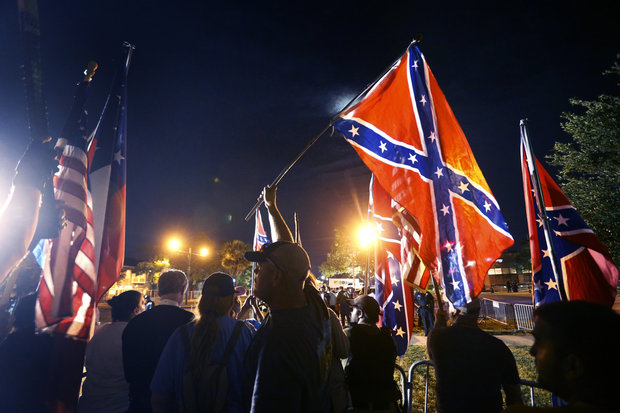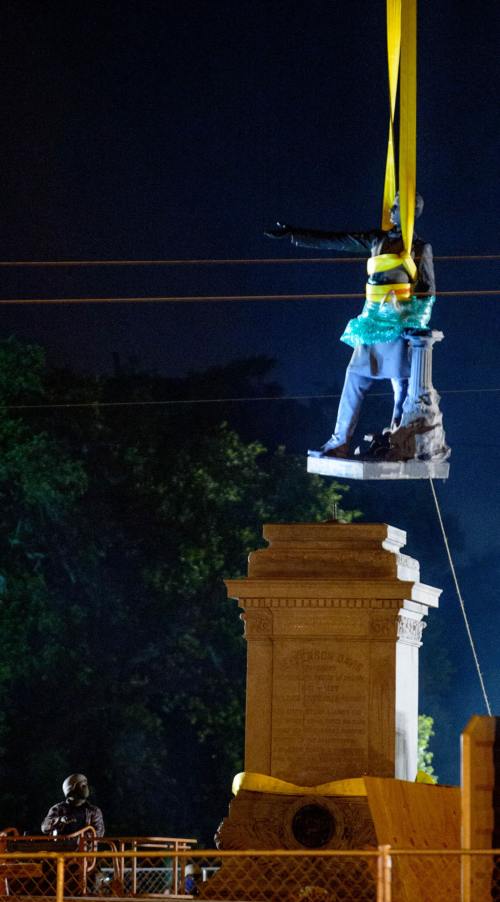New Orleans’ statue of Jefferson Davis was finally taken down. And there was great wailing and gnashing of teeth. Davis is more popular with today’s racist fringe than he ever was when he was president of the racist fringe.

It’s not prejudice, it’s pride!
Unless it’s a particularly respect-worthy statue (on artistic grounds) I almost always sneer at the bronze effigies followers put up to their leaders. Because, generally, those leaders are leading them into wars and other stupidity – have you ever seen a statue to the leader who balanced the budget? Or a statue to the mailman? It’s always some bloody-fisted troublemaker that people seem to think reflects their agenda, no matter if they left the country in ruins, in the process.
Because most Americans have finally realized that racism is a stupid thing and a bad idea, those who still hold the repugnant view are reduced to bravely using codewords and posting anonymously on internet chat channels. But there are always going to be a few who stand at the intersection between bravery and stupidity, who will stand up for a bronze memorial to something dubious.
Oddly, his modern fans make the same excuses that Davis did. When he resigned from the senate in order to lead the secessionist states, he trotted out the same kind of dog-whistles as today. He was a bit more open, but he was hardly a Nietzschean superman who’d speak the courage of his own convictions and damn everyone if they didn’t like it.
It has been a conviction of pressing necessity, it has been a belief that we are to be deprived in the Union of the rights which our fathers bequeathed to us, which has brought Mississippi into her present decision. She has heard proclaimed the theory that all men are created free and equal, and this made the basis of an attack upon her social institutions; and the sacred Declaration of Independence has been invoked to maintain the position of the equality of the races. That Declaration of Independence is to be construed by the circumstances and purposes for which it was made. The communities were declaring their independence; the people of those communities were asserting that no man was born–to use the language of Mr. Jefferson–booted and spurred to ride over the rest of mankind; that men were created equal–meaning the men of the political community; that there was no divine right to rule; that no man inherited the right to govern; that there were no classes by which power and place descended to families, but that all stations were equally within the grasp of each member of the body-politic. These were the great principles they announced; these were the purposes for which they made their declaration; these were the ends to which their enunciation was directed. They have no reference to the slave; else, how happened it that among the items of arraignment made against George III was that he endeavored to do just what the North has been endeavoring of late to do–to stir up insurrection among our slaves? Had the Declaration announced that the negroes were free and equal, how was the Prince to be arraigned for stirring up insurrection among them? [davis]

[source]
“… it has been a belief that we are to be deprived in the Union of the rights which our fathers bequeathed to us …”
As I pointed out [stderr] the “rights” that their fathers bequeathed are the same “rights” that the colonies rebelled over in the first place. Davis probably wasn’t much of a historian, to invoke George III:
“how happened it that among the items of arraignment made against George III was that he endeavored to do just what the North has been endeavoring of late to do–to stir up insurrection among our slaves”
What was happening elsewhere, in the most important empire in the world at the time – England – was that the practice of slavery had been determined to be untenable by crown law. So, as nominal citizens of England, the colonials were led into revolution by a bunch of well-heeled slave-traders, smugglers, and land-speculators, because England was going to take away certain unspoken-of rights. To own people. That was the original “state’s rights” issue, too.
“She has heard proclaimed the theory that all men are created free and equal, and this made the basis of an attack upon her social institutions”

[source]
“the people of those communities were asserting that no man was born–to use the language of Mr. Jefferson–booted and spurred to ride over the rest of mankind; that men were created equal–meaning the men of the political community; that there was no divine right to rule; that no man inherited the right to govern; that there were no classes by which power and place descended to families, but that all stations were equally within the grasp of each member of the body-politic”
See what he tried to do there? He asserts that Jefferson wasn’t talking about “equality” in the sense of, you know, “equality” but rather “equality of opportunity” in the Ayn Randian sense of “I’ve got my opportunity, thank you.”
All stations were equally within the grasp of each member of the body politic.
All stations were equally within the grasp of each member of the body politic.
This is a senator, a son of a plantation-owner, who was well-educated and grew up privileged. Never mind that he grew up well off thanks to the work of slaves, he was hardly a self-made man. Like most oligarchs, he stepped into a political career after having the opportunity to grow up wealthy by virtue of a brilliant choice in who his parents were. That equality of which he speaks? He doesn’t even know what it is. Perhaps he was right about the “grasping” part because, as a Senator, he’d have demonstrated his ability at grasping.
He was right about Jefferson, though, because Jefferson was also a slave-owning plutocrat who didn’t really mean what he said.

Nate DiMeo’s The Memory Palace podcast has an episode that I think is particularly relevant to this:
The Japanese get many things wrong, but they get some things right:

Statue to Hachiko, a dog much more loyal than Jefferson Davis [source]

Because of the recent election of Donald Trump, and recent polling which shows that “being a racist” is the most likely indicator of voting for Trump, I believe that your claim is actually false, or at least it’s not clearly true.
EnlightenmentLiberal@#1:
I stand by my observation. The fact that the majority still hide behind dog-whistles and codes, and hide their faces, or speak anonymously, I take as an indicator that they know they’re wrong.